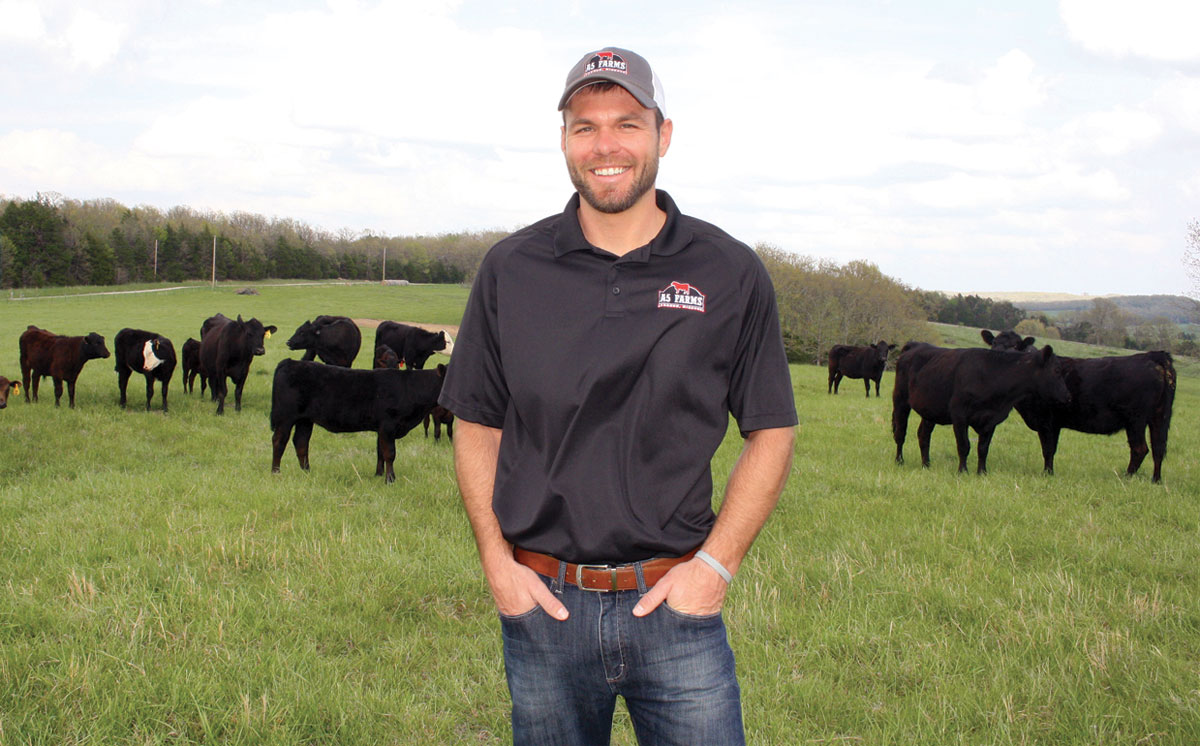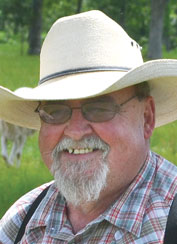
Phillip Archer returns to the Ozarks to begin his own grass-finished beef operation
Laclede County, Mo., native Phillip Archer has found a niche that combines two things he’s passionate about – good health and raising cattle.
After graduating from college at Lindenwood University, Phillip became a personal trainer in the St. Louis area, working with clients to help them reach their fitness goals. He was often asked about grass-finished beef and was able to provide his clients with a little first-hand knowledge of the beef industry.
After returning to the Lebanon area a couple of years ago, he decided to start his own grass-finished cattle operation.
“My parents and grandparents had all had small herds, so I decided to start this up,” he explained. “I used my ‘ins’ in Kansas City and St. Louis to get into those markets. A lot of my customers are my former personal training clients.”
Today, A5 Farms, which so named for the five Archers (Phillip; his parents, David and Paula; and brothers, Joshua and Isaac) offers non-GMO, all-natural, grass-finished beef. Customers can purchase USDA-inspected wholes, halves, quarters or meat bundles.
“I always loved farming when I was younger and football took me to college in St. Louis, but I wanted to be back home and farming,” he said. “Growing up, we had cows, they had calves and we’d just sell the calves. We’d finish a couple a year for our own use, but this whole meat this was my idea.”
The availability of farm-raised beef is higher in the Ozarks than in the St. Louis and Kansas City areas, which is why Phillip focuses his marketing there. One of his outlets is a company called Eat Here St. Louis.
“They buy beef, pork and produce from local farmers and then sell it to higher-end restaurants and things like that,” Phillip explained. “They might call and say they need 200 pounds of hamburger. I actually got associated with them from a personal training client I had in St. Louis.”
Phillip recently purchase 60 acres outside of Lebanon, Mo., and rents an additional 40 acres.
He has a 25-head commercial herd of Angus and Simmental-based cows, which are split in to spring and fall calving. He has recently aquired a registered Simmental bull for natural cover breeding.
“I like the carcass quality of Angus and SimAngus,” Phillip explained. “I really like the Simmental because they have a little quicker growth and you can finish them out quicker. The bull we just bought has a good carcass score and that’s what I’m looking for in the calves.”
He has opted for a more moderate frame for his females.
“Big, thick cows carry more fat,” Phillip said. “You also don’t have a huge steer from these cows to try and finish out.”
Calves are weaned at 6 months of age and are split into two groups, depending on the needs of his client base.
“I have clients who want grass-finished only, and I have some who want a little grain finish,” he explained. “When I first started, I had clients who wanted only grass-finished, but they asked why the meat was so lean and had no fat or marbling. I explained that if they wanted a little more fat, they need to have a little grain, so I offer that option. I don’t want those calves to get too fat, so they aren’t fed really heavy. My customers who want that grain finish are happy with their beef because they know where it comes from, how it was raised and who raised it.”
All steers are finished to about 1,000 pounds, with the grass-finished animals taking a little longer to reach the target weight, typically two years or less.
All of his cattle are offered mineral blocks and tubs. If the grass is a little short, he will offer a 20-percent protein tub.
He plans to retain his higher-quality females to help build his herd.
“I want to buy a few more and get up to about 50 cows,” Phillip said. “I only started this about two and a half years ago, and I didn’t think I’d be as far as I am now, so I’d really like to make my goal in five years.”
Because his business is dependent on forages, Phillip hopes to build a managed grazing system. While those plans are in the works, he’s working to improve his grass.
“We would always fertilize and lime, but we never really did any soil testing, which we’ve started doing,” Phillip said. “On the farm I just bought, the previous owner did fertilize and lime it, and plant some clover. I’m looking at adding a little more seed to give some more protein. I’m learning along the way and getting things where they need to be.”
In addition to beef, Phillip also offers pasture-raised pork from registered Berkshire stock.
“This is kind of a whole new thing. I have three sows and I’m going to see how that goes,” he said. “My grandpa had pigs a long time ago and they were in a little pen, but that’s it. I plan to have about two acres for them to run on and have shelters for them to farrow. I do finish my pigs out on corn and soybeans, with about a 20 percent protein. That means they will finish out a little quicker, but be leaner.”
Because the overall health of his animals is key to producing a high-quality beef or pork, all animals are regularly vaccinated and dewormed.
“We don’t offer any kind of hormones or steroids to any animal,” he said. “But, if there is a sick animal that I have to give an antibiotic, it will not go into the beef or pork program; they will be sent to the sale barn.”
Phillip said the farm is just a “sideline” for him, but it appears to be the one he’s proudest of.
“Not many people my age want to do something like this,” he said. “I just love being out on the farm, looking at my cattle and being outdoors.”






